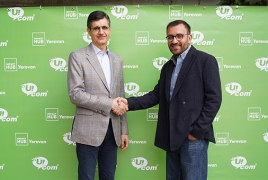Ucom and Impact Hub Yerevan announce 2025 Fellowship Cohort driving Armenia’s circular economy transition June 2, 2025 - 14:02 AMT PanARMENIAN.Net - Ucom and Impact Hub Yerevan revealed the 10 innovators selected for the 2025 Ucom Fellowship Program, a one-year incubation program accelerating circular economy solutions in Armenia. The circular economy is central to this year’s program, with projects applying the R-ladder framework (Refuse, Rethink, Reduce, Reuse, Repair, Recycle, and Recover) to transform industries from agriculture to fashion. In this regard an event was held that brought together entrepreneurs, industry experts, and the broader Impact Hub Yerevan community to explore the principles of circularity and highlight local innovators driving change. It featured an interactive session on the fundamentals of circular economy, followed by spotlight presentations from Armenian circular enterprises showcasing their innovative approaches. The event began with opening remarks by Ucom General Director Ralph Yirikian and Impact Hub Yerevan Executive Director Gevorg Poghosyan. “Green technologies and sustainability in business is something we care about deeply in Ucom, and we are happy to support this project to encourage local startups to think green. It’s important that Armenian entrepreneurs make sure that safe sustainable approaches can still bring them revenue along with great benefits to environment and local communities”, said Ralph Yirikian, General Director of Ucom. “Circularity isn’t just a trend, it’s Armenia’s economic future. This year’s fellowship, in partnership with Ucom, will provide innovators with the tools to turn waste into value and ideas into scalable businesses”, said Impact Hub Yerevan’s CEO Gevorg Poghosyan. The 10 circular economy innovators who have been selected to be part of the 2025 Ucom Fellowship Cohort include: Eco Habit: Transforms discarded nylon tights into durable household floor mats through manual upcycling, creating employment for vulnerable groups. The zero-waste process gives new life to textile waste without harmful chemicals or energy-intensive methods. SeElabUS: An AI-powered platform accelerating circular entrepreneurship through gamified training and digital tools for SMEs. It reduces educational waste by replacing traditional programs with scalable, practice-based learning that connects entrepreneurs to funding and markets. Bee Green: Produces reusable beeswax food wraps from local materials, eliminating single-use plastics in kitchens. The fully biodegradable products demonstrate closed-loop sustainability with a one-year lifespan before natural decomposition. BioHumus: Converts agricultural waste into organic fertilizer using vermicomposting, packaged in repurposed polypropylene bags. This circular system improves soil health while diverting farm waste from landfills. SunHome Stepanavan: An eco-lodge promoting sustainable tourism through rainwater harvesting, solar energy, and waste recycling initiatives. The guesthouse educates visitors on circular practices while supporting local food systems. Zenith Academy: Trains technicians in renewable energy systems using a "learning by doing" model with repurposed equipment. Their smart energy labs demonstrate circular principles through industrial waste-to-energy projects. Grant Legacy: Cultivates medicinal herbs using composted organic waste, with byproducts transformed into teas, soaps, and candles. Solar-powered drying and seed-to-sale traceability ensure a zero-waste production cycle. By Botany: Produces nettle fiber textiles that biodegrade naturally, reducing fashion industry pollution. The brand's seed-embedded clothing line literally grows into plants after use. 4Green: AI-optimized HVAC systems extend equipment lifespan while reducing building energy use by up to 30%. Wireless sensors minimize material waste in retrofitting existing structures. A-nush Textile: Creates unique educational toys from textile factory scraps, employing women artisans. Each doll tells a sustainability story while diverting fabric waste from landfills. Throughout this 12-month program, 10 participants will receive expert mentorship in circular design and technology, along with workshops on business modeling, artificial intelligence, and green financing. They will also gain access to a global network of over 100 Impact Hubs and have the opportunity to receive funding of up to 400,000 AMD for the most promising projects. Impact Hub Yerevan, founded in 2016, is a representative of a network of 110+ Impact Hubs operating around the world. It provides its member entrepreneurs and innovators with a wide range of community innovation resources, educational programs, and events, all in a very stimulating and empowering workspace. Impact Hub is also a social innovation incubator and has many years of experience in designing and implementing incubation and acceleration programs. Since its establishment, Impact Hub Yerevan has designed and implemented 40+ programs, more than 500 educational courses, and events, and now hosts more than 350 members implementing over 100 projects representing almost all sectors operating in Armenia. Yerevan has dismissed Turkey’s demand to shut down the Armenian nuclear power plant as “inappropriate”. Armenia will loan 2.9 billion drams to Nagorno Karabakh (Artsakh), according to a draft government decision. The Ministry of Ecology and Natural Resources of Azerbaijan has “strongly condemned” Armenia’s decision. Kerobyan has said that for the first time in the history of Armenia, the volume of foreign direct investments amounted to about $1 billion. Partner news |